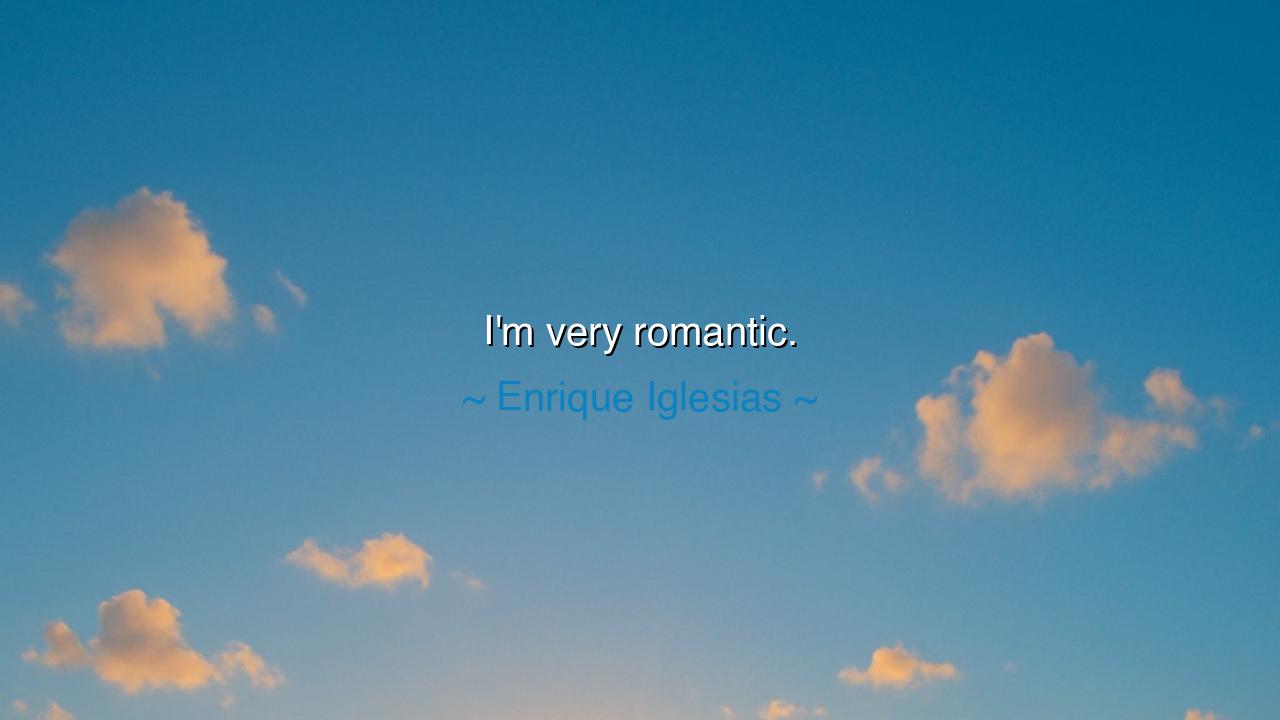
I'm very romantic.






"I'm very romantic." – Enrique Iglesias. With these simple words, Iglesias reveals a deep and ancient truth that resonates within the hearts of all who understand the transformative power of romantic love. To be romantic is not merely to chase after fleeting passions or idealized dreams; it is to embrace the sublime and sacred connection between two souls, the magic that occurs when hearts align. True romanticism transcends the boundaries of mere attraction and enters the realm of devotion, where love is not just a feeling but a way of being, a force that shapes the very essence of existence.
In the ancient world, the concept of romantic love was often seen as a divine gift, bestowed by the gods. Eros, the Greek god of love, was not just a playful figure but a powerful force that could sweep mortals into deep and passionate connections. In his Symposium, Plato explores the nature of love and beauty, suggesting that romantic love is not just about physical attraction but about the pursuit of higher truths and goodness. This love elevates the soul, urging it toward greater understanding, connection, and even divinity. To say that one is "romantic," as Iglesias does, is to align oneself with this timeless and powerful tradition of seeking something greater in love—a connection that transcends the mundane and touches upon the sacred.
The ancient myths, such as that of Orpheus and Eurydice, embody the romantic ideal. Orpheus, the great musician, was so consumed by his love for Eurydice that he was willing to descend into the underworld to bring her back. His journey was fraught with sacrifice and trial, and though he failed, the depth of his devotion is a testament to the enduring power of romantic love. He did not simply wish for love; he was willing to risk everything, even life itself, to reunite with his beloved. This willingness to transcend ordinary boundaries for the sake of love is what defines the romantic spirit, a spirit that Iglesias seems to embrace with his declaration of being "very romantic."
Similarly, consider the story of Pablo Neruda, the Chilean poet whose romantic poetry has touched hearts across generations. In his Canto General, Neruda writes not just of love between individuals but of love as a force that shapes history, a force that can overcome the deepest of struggles. Neruda’s poems do not shy away from the complexities of love, but rather embrace its messiness, its ability to heal and transform. Much like Iglesias, Neruda saw romantic love as more than a simple emotion—it was an experience that could change the very fabric of existence. To be romantic, as Iglesias suggests, is to recognize love as a powerful, life-changing force.
The lesson here is that being romantic is not a fleeting or shallow ideal, but a deep commitment to seeing the world through the lens of love. To embrace romance is to recognize that love is not simply a private matter, but a universal force that can transcend barriers, heal wounds, and bring beauty to the world. In romantic relationships, we must seek to be fully present, not just in moments of joy, but also in moments of struggle. True romance is not about idealized perfection, but about embracing the imperfections of our relationships and finding in them the sacred connection that binds us together.
In our own lives, we must cultivate the romantic spirit by being open to love in all its forms—whether through friendship, family, or romantic partnership. We must approach each relationship not as a transaction or a means to an end, but as an opportunity to connect on a deeper level, to give of ourselves without expectation and to receive the same in return. We should embrace the vulnerability that love demands, knowing that in doing so, we are participating in something far greater than ourselves. Like the ancient heroes and poets, let us recognize that love is not a fleeting experience, but a journey—one that requires courage, dedication, and a willingness to face both the joys and challenges that come with being truly connected to another.
Thus, let us live romantically, not in a shallow or whimsical way, but with the full understanding that romantic love has the power to transform, to heal, and to elevate our lives. Like Iglesias, let us embrace the depth of love, knowing that it is not just about the moments of passion and desire, but about the dedication to another person, the sacrifice and growth that come with being in a truly loving relationship. By doing so, we walk the timeless path of the romantics, where love is not just an emotion but a guiding force that shapes our world for the better.






AAdministratorAdministrator
Welcome, honored guests. Please leave a comment, we will respond soon